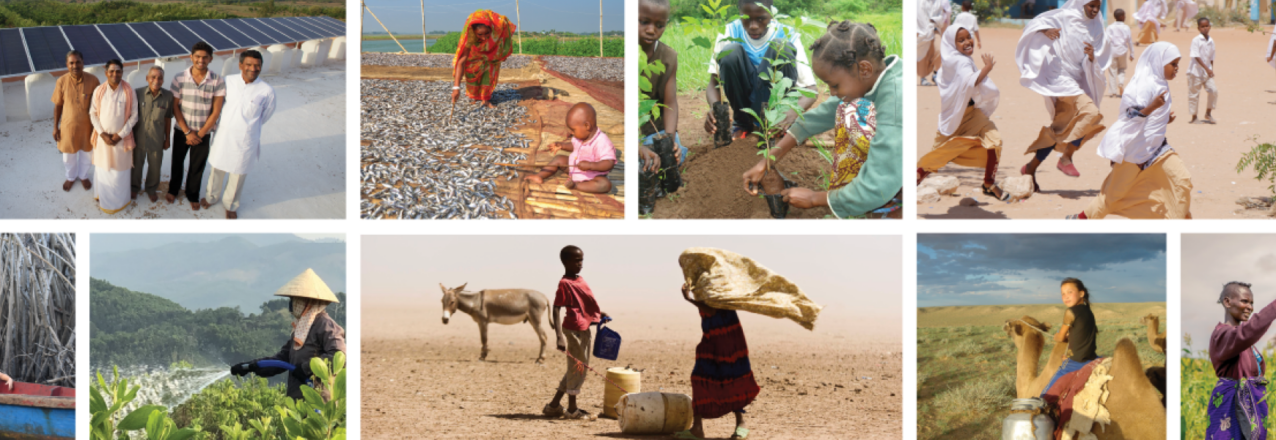Climate change is a global crisis. As temperatures and sea levels rise, people around the world are increasingly seeing heat waves, droughts, floods, cyclones, and wildfires upend their lives. The effects of climate change are not equal – they disproportionately impact the poorest and most marginalized communities USAID works to support every day. Climate change affects virtually everything that USAID does and threatens the development progress it has supported over more than 60 years.
Climate change increases water and food scarcity, displacement, and the need for humanitarian assistance, as well as contributes to conflict and disrupts economic stability. Yet at the same time, USAID’s response presents an opportunity to improve livelihoods. Decarbonizing economies means less air pollution that negatively affects health. Building climate-resilient infrastructure means people are safer when disaster strikes and reduces the need for costly repairs after every storm. Investing in green jobs presents an opportunity to make workforces more equitable and inclusive.
That is why USAID has developed a new Climate Strategy that will guide its work through 2030. This new Strategy takes a “whole-of-Agency” approach that calls on all corners of USAID to play a part in the response. USAID will work on the ground with partner governments and local actors to set the global trajectory toward a vision of a resilient, prosperous, and equitable world with net-zero greenhouse gas emissions.
Addressing the climate crisis requires a holistic approach to development. Every USAID sector and Mission has a role to play in transforming global systems like agriculture, energy, governance, infrastructure, and health. This Strategy includes six ambitious high-level Targets that reflect how a whole-of-Agency approach can increase USAID’s impact. USAID will update these 2030 Targets and supplement them with interim Targets throughout the Strategy’s lifetime.
USAID’s Climate Strategy is built on several foundational principles, which will be incorporated into all planning and activities: Locally-led Development, Equity and Inclusion, Private Sector Engagement, Nature-based Solutions, and Evidence, Technology, and Innovation.
Climate Change and Land and Resource Governance
Much of USAID’s climate change programming is inextricably linked to the need for clear and secure land and resource governance (LRG) systems. Secure LRG systems can have significant positive impacts on the sustainable management of land and provide incentives for landowners to think longer term about conserving and managing their land for future generations. Secure land tenure can also encourage individuals and communities to adopt practices that promote greater adaptation and resilience to climate change impacts. In addition, promoting not just secure, but also equitable and inclusive systems of land governance is critical to ensure that women and vulnerable populations who might easily be excluded from formal land rights processes and who might be disproportionately impacted by climate change have a clearer pathway to obtain secure land rights. Additionally, Indigenous Peoples and local communities, who own or manage more than a quarter of the world’s lands, are key stakeholders and agents of change in addressing the climate crisis. There is clear and growing evidence that the lands that Indigenous Peoples and local communities manage are highly effective at sequestering emissions. USAID is committed to continuing to partner with Indigenous Peoples and local communities to lead climate actions, strengthen capacities and leadership opportunities, and promote legal recognition of their tenure rights in line with the USAID Policy on Promoting the Rights of Indigenous Peoples (PRO-IP).
Visit the Climate Strategy Hub on Climatelinks to learn more about USAID’s new Climate Strategy
Strategic Objective 1: Targeted Direct Action – Accelerate and scale targeted climate actions.
Strategic Objective 2: Systems Change – Catalyze transformative shifts to net-zero and climate-resilient pathways.
Special Objective 3: Do Our Part – Strengthen operations and approaches to programming to address climate change and further climate justice within USAID and our partner organizations.


